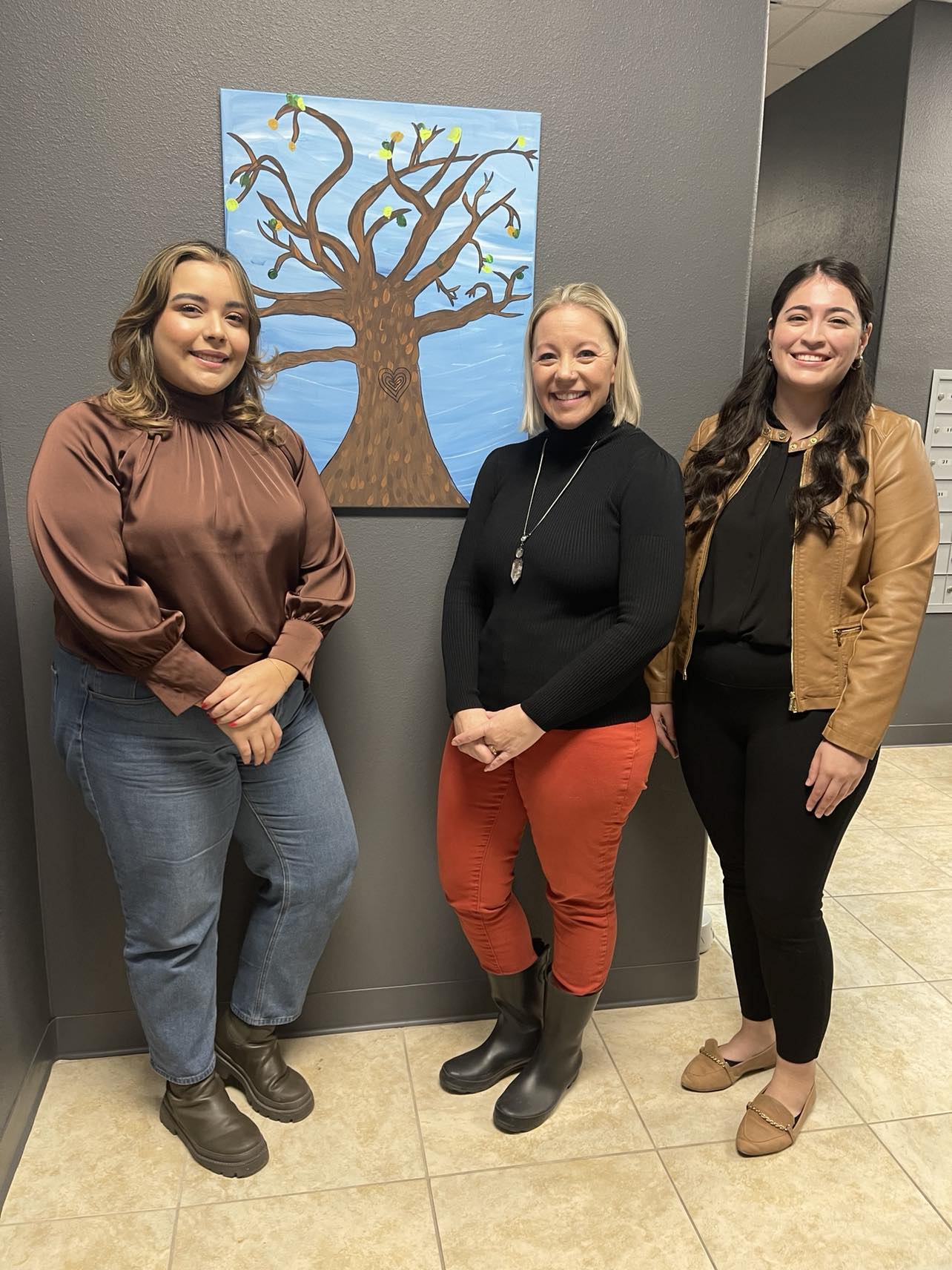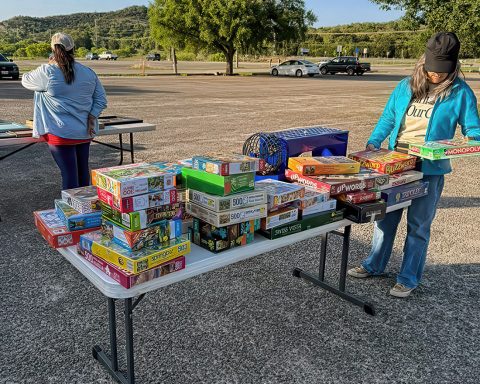With the help of Canyon Lake-area charities, little green leaves made of tiny thumbprints are beginning to blossom on a paper tree in the Children’s Advocacy Center of Comal County’s (CACCC) office in Canyon Lake.
They symbolize growth and new life for the abused children who place them carefully on the branches after completing therapy at the 1,500-square-foot center, which is tucked away in an unobtrusive strip shopping area on the north side of the lake near Suburban Propane.
In this neutral, child-friendly facility the CACCC — one of 72 statewide — provides abused children with a safe place to tell their stories for investigations by law enforcement and the Texas Department of Family and Protective Services (CPS).
The organization exists to aid in the prevention, detection, investigation and treatment of child abuse.
Executive Director Stacy Dufur said CACCC, which already operates two offices in New Braunfels, decided to open the Canyon Lake office in 2022. As the county grew, so did the percentage of abused children who live in Canyon Lake, Spring Branch, Bulverde and other unincorporated areas of the county.
Only half of the children she works with live in New Braunfels.
Picking up a child after school in Canyon Lake and getting them to therapy in New Braunfels and back home in time for dinner doesn’t work for families in crisis, especially when finances are tight.
“If the alleged perpetrator is someone in the home, that may have been the breadwinner, that really throws children and their non-offending caretakers into a different state of crisis,” Dufur said. “… At that point, finance and security become a real thing, and our advocates are able to sit with them, for one, and for two, to be able to point them to different resources that our community offers.”
Organizations like the Canyon Lake Pilots, CRRC of Canyon Lake and the Canyon Lake Area Chamber of Commerce are stepping up for these young victims and their families by providing resources, referrals, funding, and the support they need to cope with their new lives in the criminal court system.
The Pilots buy H-E-B gift cards and snacks for therapy areas. In addition to serving as a resource, the CRRC provides food assistance and medical equipment like canes and walkers. Comal County Pct. 1 Commissioner Donna Eccleston and Pct. 4 Commissioner Jen Crownover also support efforts at the new office by making sure the community knows the CACCC is there to help children caught up in active CPS investigations.
Care Coordinator Yazine Castaneda said the Salvation Army and the Hope Center in Spring Branch provide rental assistance.
Families that have experienced food poverty might not be able to pay for electricity, buy food or find stable housing, she said.
“We have hands around both sides of the lake that make sure every child is getting these services,” said Director of Outreach Shannon Dixon.
Dufur said she’s personally reviewed over 13,000 reports of suspected child abuse and child sexual assault in Comal County since 2015 in order to determine which cases require forensic interviews.
Around 400 of these children are referred to the CACCC each year, and once in the system they can receive therapy and support through the age of 18.
CACCC takes a multidisciplinary approach in the prevention, detection, and investigation of child abuse, which can be sexual, physical, or neglectful and encompasses domestic violence. Not providing a child with adequate medical support also is considered abuse.
“What we see at the CACCC is probably the worst of the worst,” Castaneda said.
Children who are sex trafficked also are cared for by advocates. Although some of these victims were removed from their families by strangers, most of them were trafficked by family members who used them to earn extra money.
Dufur said the center’s average client is an eight or nine-year-old girl who has been sexually abused by someone who is a family member or someone close to their family. Rarely is the abuser a stranger.
CACCC provides free, trauma-focused cognitive behavioral therapy for these children to help them process the trauma they’ve endured and provide the tools they need to survive long into the future.
Martin said this process takes between four to eight months. Some families arrive with more than just one child in need of support.
“You know, they’re all different and they’re all processing at a different level,” she said. “So it’s really great to work with all of them in general.”
The sad truth is that for many children, a forensic interview and counseling services at the CACCC are just the beginning of a long legal journey that might not have a happy ending.
Alleged abusers have a constitutional right to face their accusers in court — even if they’re eight-year-olds.
Children can panic at the thought of confronting them in court.
“Sometimes that will throw them into a tailspin and they’ll need a little bit more counseling services to get into that,” Dufur said. “And they can come back in up until they turn 18.”
Children also need counseling when justice isn’t served or their abusers receive light sentences.
But the CACCC wants to stop abuse before it happens, which means training as many people as possible to identify possible child abuse and report it.
Dixon said the center provides free training called Darkness to Light to groups and individuals who would like to learn more. Anyone 18 and older is considered a mandatory reporter in the State of Texas.
“We have our teachers that are our first-line reporters, we have our professionals that during their tenure at some point have heard about recognizing and reporting abuse they’ve heard,” she said. “We need to reach out our grassroots to families and care providers who might not have that insight.”
For example, a child might return from a friend’s house and tell an adult that something strange happened. A parent might find something off about a cousin or uncle.
“So we really need to reach out to our broader community that will give them the ability to say ‘well, that doesn’t seem right to me. Maybe I should make a report.'”
Statistically, one in 10 children will be sexually abused before they turn 18. Seventy-three percent will not tell anyone about it.
Sexual predators count on this shame to silence their victims, Dufur said.
“You know, it’s something people don’t talk about in the community as a whole, so in general they can get away with it. So the more that we shed light on it the less likely it is to occur. It actually is the goal of the children’s advocacy centers of Texas to end child sexual abuse in Texas. I don’t know what the timeframe is on that, and I hope we see it in our lifetime, but that is their goal.”




